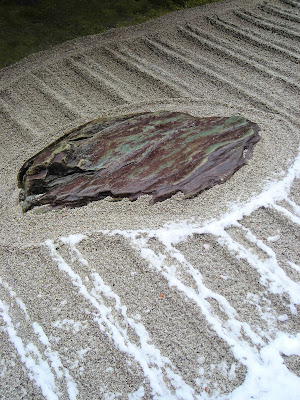Listening to a people hear
13th August 2009
This tells you a bit more about cicadas than the published version.
And for those interested in finding out more about Japanese onomatopoeia, here are the grammatical terms:
- 擬声語 giseigo or 擬音語 giongo (words that mimic sounds that actually exist in nature)
- 擬態語 gitaigo (mimetic words used to convey actions, non-auditory senses, bodily feelings or mental states. The last two are sometimes classified as 擬情語 gijougo).
...
If dogs go woof and pigs go oink, what do cicadas say?
Now that it’s summer, they sing through the long days and short nights but I still don’t have the exact word to pin down their chirring.
When muffled by a closed window, the sound falls on the ear like a maracas chorus but when heard under trees shrilling with cicadas, it bares jagged teeth. Listen long enough and it could saw your head in half.
If dogs in Japan go wan-wan and pigs go buu-buu, what do cicadas say?
It depends partly on the species. There’s jiii-jiii, miii-miii while another kind has been named tsuku tsuku boushi because that is, apparently, what part of its call sounds like.
Many races have listened to the world and tried to capture its sounds as exactly as possible. Wan-wan is not one of a kind when there’s woof woof, ouaf ouaf and arf arf.
But Japanese is particularly rich in soundtracks of things that have none – things such as sight, sensation and emotion. These ideas in sound cut across the usual categories so an omelette, a towel and a balloon can all be fuwa-fuwa if soft and light.
The lines between mental and physical states, between animate and inanimate, disappear. A messy room, like a cluttered mind, is gocha-gocha and the mysterious residue on the dining table that left your fingers sticky is as beta-beta as a couple plastered all over each other.
These words pitch a narrative out of a monotone. They are the words you reach for when telling a story, when you want people to know how ira-ira irritated you became when waiting for a friend for over an hour.
At first, you waited with nothing much on your mind, bon yari staring off into space. But then a quarter of an hour became half and half became a full hour. Then thunder began to goro-goro and the rain raged down zaa-zaa.
Splashing to the nearest bus-stop, you called your friend, only to learn that she was still at home. You snapped at her to stop guzu-guzu dawdling and sassa get there at once. But before she could, a car zoomed by, straight through a puddle, and left you bisshori drenched.
By the time your friend arrived, you were kan-kan furious.
Comics and novels make full use of this aural drama of clashing consonants and colluding vowels because they too are in the business of telling stories.
But as a situation becomes more formal, these words often end up being shoved behind curtains and into closets. Chances are, you won’t find them in a thesis because they smell too human and we like to pretend that academic papers are written, not by people, but by brains on legs.
To some ears, the repetition in words like jiro-jiro (to stare) and kira-kira (twinkle) sounds childish.
Childlike may be a better term. This is language wide-eyed and inventive, filling its tiny fists with clay. It clumps syllables together, moulding sound as it tries to show you that thing, you know, that thing that goes hurdurdurdur.
But clay hardens and the child’s world grows focused by growing narrower. The more choices he makes, the more he has to give up because to go through one door is to close five.
The world of Japanese idea sounds has matured beyond the days when it still sparkled pika-pika new. That there are dictionaries cataloguing these sounds suggests that they are no longer instinctive and obvious, even to native speakers.
For foreigners, they represent another set of lists to be remembered and puzzled over. It’s easy to see how thunder and heavy things rolling down would both go goro-goro but why would someone lazing at home be assigned the same sound?
And what’s the connection between leaves drifting hara-hara to the ground and someone being hara-hara nervous?
Yet in the process of linking experiences I share with sounds I don’t, memories are accreting, making the words easier to see and recall.
Waku-waku: a state of excitement or happy anticipation.
My waku-waku: an orchestra tuning up, setting off flares of sound in the dark of a concert hall.
Kichin-to: Neatly, precisely, properly.
My kichin-to: Approval when I see something done neatly, precisely and properly. Tinged with the laughing despair that comes from knowing my folds, whether in paper or cloth, will never be as crisp or aligned as the Japanese ideal and that my knots will always have the unsteadiness of the yoro-yoro drunkard.
These ideas in sound ask you to use your ears in a different way: not just listening to the thing described but also to how a people have decided to hear it and in going through the door they picked over others, find a world you might have missed on your own.
So though the cicadas outside my window seem to be saying schwiiiing, I shall try hearing as the Japanese hear and see if that takes me to the summers they’ve stored on the other side of the door that swings open on cicada trills: Miiiiin. Miiiiin. Miiiiin.
...
感謝コーナー:Many thanks to Chizu-san and Iuchi-kun for help with cicadas.
Thursday, August 13, 2009
Subscribe to:
Post Comments (Atom)

No comments:
Post a Comment